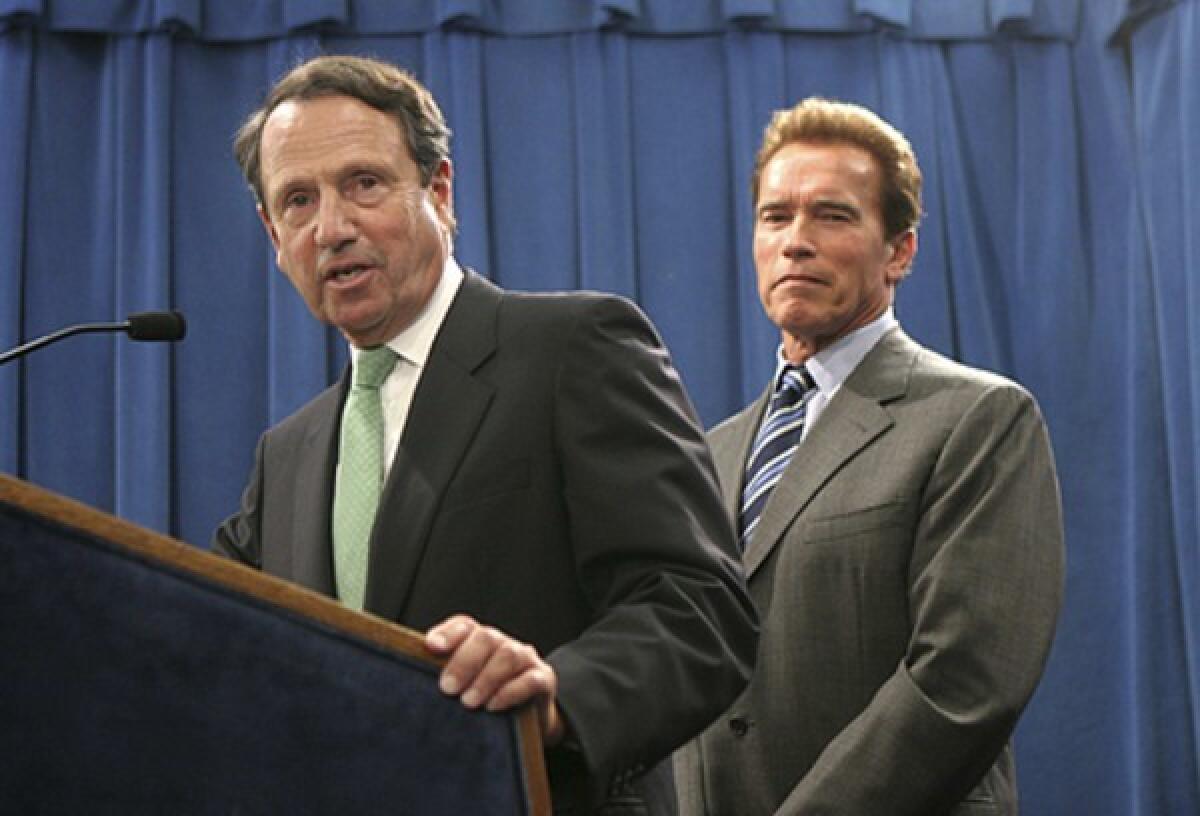California tax reform plan much too bold for Capitol

- Share via
From Sacramento — Sure, you can’t please everyone. That’s a given on anything controversial. But come on! Maybe at least a few people?
Maybe that’s impossible in the current climate of public pique and partisan politics.
Only Gov. Arnold Schwarzenegger and his finance director, Mike Genest, could be found among the Capitol crowd supporting the long-awaited recommendation Tuesday of a blue-ribbon tax commission.
“I would sign it immediately” if it were a bill, Schwarzenegger told reporters. “Without any doubt.”
Of course, this is a governor who constantly seeks out things new and bold. And the tax proposal was all of that -- much too new and bold for most Capitol denizens, especially those representing special interests.
As Genest told me: “It shouldn’t come as any surprise that lobbyists in Sacramento are in favor of maintaining the status quo unless they are confident that the change will serve their interests. That’s why they’re called ‘special interests.’ ”
But there was an early sign of trouble for this commission last fall when politicians even fought over what to call it, as the governor revealed Tuesday. Legislators insisted its name not include the dreaded “T” word. So they named it the snooze-inducing “Commission on the 21st Century Economy.”
“They didn’t want to have the name ‘tax’ in it,” Schwarzenegger recalled. “So I continued calling it the ‘tax commission’ because I think it is crazy to call it the ‘21st century commission.’ But that’s the only way we could move forward.”
The commission was a joint creation of Schwarzenegger and the Legislature, whose main advocate was Assembly Speaker Karen Bass (D-Los Angeles). Its charge was to update and stabilize the state’s tax structure, making it less vulnerable to economic booms and busts. The goal was a revenue stream with fewer peaks and valleys. The panel also was asked to propose a tax system that improved the state’s economy and competitive position.
The 14-member commission was headed by Gerald Parsky, a Rancho Santa Fe investor who’s a former University of California regent and Republican state chairman. Politically, he’s more of a pragmatist than an ideologue.
You can read the commission’s report at its website, www.cotce.ca.gov.
In summary, it recommended greatly reducing and simplifying the personal income tax, lowering the top basic rate from 9.3% to 6.5%. (Except, as now, there’d be an extra 1% tax on income exceeding $1 million to fund local mental health programs.) There’d be only one other rate, 2.75%, for taxable income up to $56,000 for couples.
Currently, the volatile income tax supplies 55% of the state general fund, up from 11% in 1950. Under the commission’s proposal, it would provide 32%.
To make up for the lost revenue, the commission would impose a new, never-heard-of-before “business net receipts tax.” This would be a backdoor way of extending the sales tax to services. Only it wouldn’t be a sales tax; it would be the net receipts tax.
Parsky said the panel considered it not “fair or equitable” that the fast-growing service industry escapes being “part of the tax base” because it “benefits . . . from all the services provided by the government.”
The new business tax would be 4% of receipts minus the cost of purchases -- but not the cost of salaries and benefits, an exclusion that prompted instant opposition from the left. Labor leaders and liberals fear -- justifiably, I suspect -- that companies would have a tax incentive to fire employees and hire independent contractors, whose labor would be deductible.
Business interests also immediately opposed the proposal, although it included elimination of the 8.8% corporation tax and the 5% state portion of the sales tax. There would still be local sales taxes.
The most common complaint was that the net receipts tax “wasn’t cooked.” There is no identical model for it anywhere in the world, not even Europe’s value-added tax.
Bill Hauck, president of the California Business Round Table and one of five commission members who refused to endorse the proposal, said the receipts tax lacked enough study to predict its effect on California’s economy and jobs.
And Allan Zaremberg, president of the California Chamber of Commerce, asserted: “We must not rush into replacing our 70-year-old tax system with an unproven experiment.”
One major problem, however, is that it really isn’t a seven-decade-old tax system. The system was greatly altered 31 years ago when voters drastically cut property taxes and substantially threw California’s tax structure out of whack.
The commission toyed with recommending an increase in commercial property taxes, said one liberal member, UC Berkeley law school dean Christopher Edley Jr., but that quickly became “a total nonstarter. I mean, forget first base. It didn’t even get out of the batter’s box.”
Bass was holding her tongue, trying not to express disappointment in the commission. When she first proposed its creation, the speaker envisioned the panel proposing something more practical and simple: reducing the sales tax rate and spreading it to currently untaxed services.
She promised a “thorough and objective public review” of the panel’s recommendations.
Good idea, but don’t stop there.
“My biggest message to dysfunctional Sacramento is to get something done,” Parsky says. “If you’ve got a better idea, get it done.”
True, the commission’s tax recipe isn’t cooked. Perhaps it should be tweaked and tested. Or dumped and redrawn. Those are tasks that full-time legislators are hired to perform -- without fretting about special interests. You don’t have to please them all, just a few more than the tax commission did.
More to Read
Sign up for Essential California
The most important California stories and recommendations in your inbox every morning.
You may occasionally receive promotional content from the Los Angeles Times.











